Opening the Apocalypse Hotel with CygamesPictures President Nobuhiro Takenaka, Director Kana Shundo, & Screenwriter Shigeru Murakoshi
by Lynzee Loveridge,In the remains of Tokyo's Ginza district stands the glamorous Gingarou Hotel. The staff work diligently to provide expert service for its guests. The only problem? Humanity has left Earth behind.
The Apocalypse Hotel anime opened its doors to viewers in April and quickly caught attention for its perfect blend of comedy and emotional moments. The series stars a cast of robots trying their best to manage a hotel abandoned by its clients and adapt to new visitors from beyond Earth.
We spoke with CygamesPictures President Nobuhiro Takenaka, Director Kana Shundo, and Screenwriter Shigeru Murakoshi about crafting this alternate version of Tokyo's high-end Ginza district, how the team connected robots with their audience, and if the studio has more original anime works on the horizon.
When did you first begin drafting the ideas behind Apocalypse Hotel? What was the process behind developing the story for this original project?
Screenwriter Shigeru Murakoshi: I think it was around 2020 when Takenaka-san from CygamesPictures approached me. How stories are created varies from work to work, but in this case, I first heard Takenaka-san discuss the concept and project proposal when he said, "I want to make a story about an extraterrestrial life form coming to a hotel run by robots on an Earth where humanity has disappeared." I then created an overall scenario of what would be a good starting point and what kind of events would be interesting. During that process, I received ideas and opinions from [Sōtarō] Wada-san, who oversaw each episode script, and [Director Kana] Shundo-san, and decided on the details.
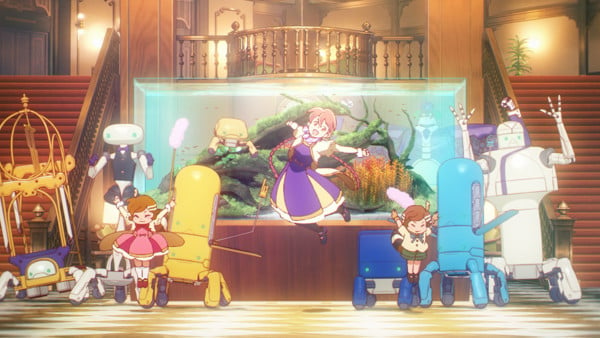
After previously working as an assistant director on other anime projects, what attracted you to Apocalypse Hotel as a director?
Director Kana Shundo: The deciding factors for my participation were the proposal and Izumi Takemoto's original character illustrations. I had already read the synopsis for 12 episodes at the proposal stage and felt that they were highly polished and interesting as entertainment. I also found Izumi Takemoto's original character illustrations very appealing. I felt that the designs, which had a nostalgic feel but were by no means outdated, matched the original animation project perfectly.
As a director, were there any specific challenges you had to overcome while working on Apocalypse Hotel?
SHUNDO: On past projects, I'd only thought about the episode I was responsible for, but when I started working as the director of this project, I had to think about all 12 episodes and work on them all simultaneously, which was difficult. It was always a challenge to decide what to prioritize and make decisions in a limited amount of time. Until the very end, I caused trouble during production due to my own shortcomings. However, thanks to the staff, we were able to complete a 12-episode TV series.
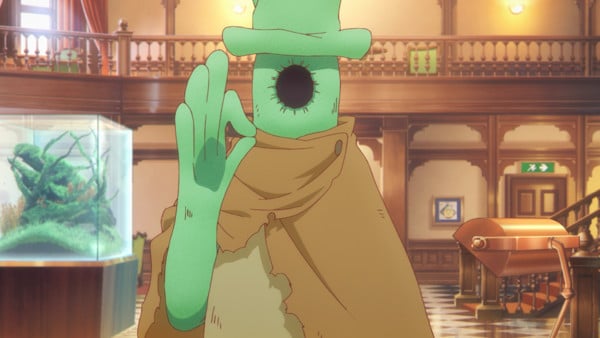
As president of CygamesPictures, I'm sure you're responsible for all kinds of tasks at the studio. Can you talk to us about your involvement in Apocalyse Hotel?
CygamesPictures President Nobuhiro Takenaka: I've been involved in this project's production from the early stages and oversaw its overall progress as production manager. I've been allowed to make vague suggestions about the beginning and end of the story and provided some random ideas in scenario meetings. I see my role as being the "jokester."
How did you know Apocalypse Hotel was a hit project to greenlight? What about the story or characters appealed to you?
TAKENAKA: I generally decide whether a project is viable at the initial synopsis stage. Regarding this work, I felt that this project would succeed once we solidified the setting of androids running a hotel in a post-apocalyptic world and the vision for the ending. If I hadn't felt the project would work in the early stages, I wouldn't have decided to proceed with the project.
Although the story takes place in a post-apocalyptic world, the basic idea was to make it a fun animated series. It's a work where sadness and joy are two sides of the same coin, and depending on the viewer, it can be interpreted as either. This is also because the main character isn't a human. But I was fascinated by the idea of expressing such things.
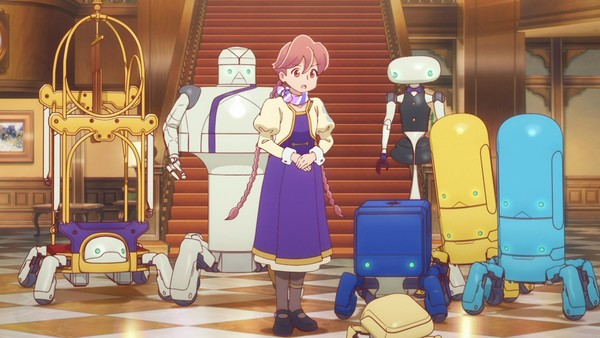
Most people think of robots as “machines” that lack emotions. How does Apocalypse Hotel use its characters to connect with the audience emotionally?
MURAKOSHI: Although it is true robots are "emotionless machines," the robots in this work are programmed to "manage the hotel created by the owner based on his beliefs." This is connected to their objective of "maintaining the hotel until the owner returns." Therefore, it's clear what they want to do and what obstacles they face. I thought that when viewers saw the robots performing their duties so diligently, they'd feel a sense of bravery for them and become attached to them as if they had feelings. I also think the fact they have been left behind and their comical designs play a major role in helping viewers feel attached to the robots.
How would you describe the main character and Hotelier Robot, Yachiyo?
MURAKOSHI: For a while after we started planning the project, Yachiyo was a character that stood out for "seeming emotionless" and "calmly making decisions." As we were thinking about the story and considering recent advances in AI and robots, though, we started thinking, "If the story is set in the near future, wouldn't it be better if the character's thought patterns were more human-like?" However, that alone wasn't enough for the main character. Then, Takenaka-san suggested, "What if the robot is equipped with an unknown expansion function?"
We also experimented with a story where the robot "shows reactions that deviate from its program as a hotelier." By doing so, we were able to give Yachiyo a "mystery" that somehow makes her different from other robots of the same type. I think this helped her gain the appeal needed to be the protagonist.
SHUNDO: I tried thinking of Yachiyo-san as a working woman, not a moé character. However, because she is a hotelier robot, she is inflexible and overly serious. She has some separation from our human values, which, I hope, are portrayed as her unique personality and charm.
Apocalypse Hotel's setting is Tokyo's high-end Ginza district after society collapses. How did the team make the area recognizable as "Ginza" in this sci-fi story? Are there landmarks viewers can spot? Was there something appealing about Ginza as a setting compared to Tokyo's other wards?
MURAKOSHI: When we first created the story's scenario, we envisioned an actual clock tower as the setting for the hotel, and the commercial facilities in the area would also be the setting, so you'll recognize many landmarks if you visit Ginza. However, everyone involved in the visual production thought about how to express the "Ginza-ness" of the townscape, as well as making the interior of the hotel where the robots reside a retro and elegant space, while also giving a sense of cutting edge and tradition that the area has to offer.
The reason why Ginza was chosen as the setting is because, as mentioned in the series, the area has traditions dating back to the Edo period but has also been on the cutting edge throughout its history, such as with the influx of Western culture, department stores, and it is an attractive area with Tokyo Bay nearby.
TAKENAKA: For the "Ginza-ness," we used a symbolic building of Ginza as the setting, and we set the hot springs in front of the Kabukiza Theater. But we left everything else up to the director.
The reason we chose Ginza is that it's a location where high-rise buildings can express the sense of a collapsed civilization to a certain extent, and it is close to the sea. I also thought if we caused sea levels to rise, we could create a sandy beach near Ginza. In the end, there were no episodes with swimsuits, though. One of the charms of Ginza is that it can be called "ZAGIN."
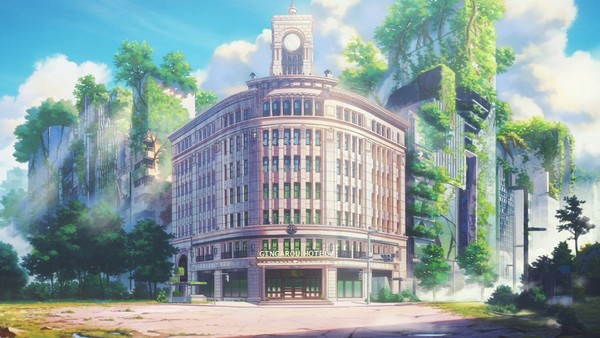 ©APOCALYPSEHOTEL Partners |
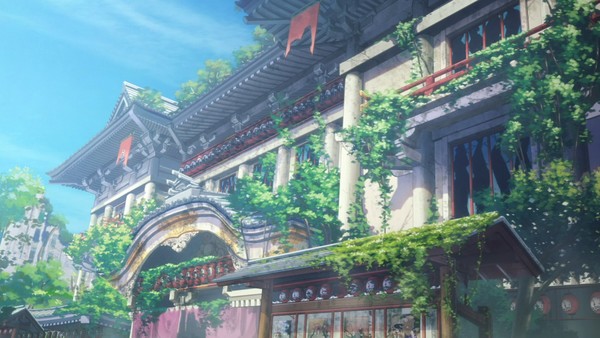 ©APOCALYPSEHOTEL Partners |
SHUNDO: I wanted to create a landscape of ruins and greenery while leaving as much of the cityscape intact. To achieve that, I created a setting where humanity escaped Earth due to a mysterious virus.
The Ginza Wako department store, which I used as the model for the Gingarou Hotel, is a very famous landmark. Not only is the architecture beautiful, but its location facing an intersection is also eye-catching. I also think the Kabukiza Theater, which was shown in the first episode, is a monument that gives a sense of harmony amid the skyscraper cityscape and is very Ginza-like.
Robots have continually become more advanced in our world, from ASIMO and Pepper to the Alter 3. Was our current understanding of robots an influence on the robots in Apocalypse Hotel, or is it taking a more fantastical approach?
MURAKOSHI: As I mentioned earlier, while working on the story, we all researched the current situation of AI and robots and were influenced by things like how much functionality we could give to the robots. Personally, though, I still consider this work to be highly fictional entertainment. So, in this regard, I would say it's not completely rooted in reality, but rather, as seen with Yachiyo, it takes a fantastical approach to its depiction.
TAKENAKA: I believe it's been drawn with a fantastical approach. It depends a lot on the sensibilities of the director and designer.
Previous CygamesPictures anime series included other media tie-ins, like mobile games. Now, following Bang Brave Bravern, Apocalypse Hotel is another 100% original IP for the studio. Can audiences expect more projects like this from the studio in the future?
TAKENAKA: It takes a lot of time to create an original work. I had started to feel like focusing on adaptations, if possible. But I've been hearing a lot of feedback from both inside and outside the company saying they're looking forward to our original works. So, my feelings that we should keep creating original works have been rekindled.
We've already launched several original projects. I hope to continue creating exciting and innovative projects.
If there was one task in your life you could assign to a robot, what would it be?
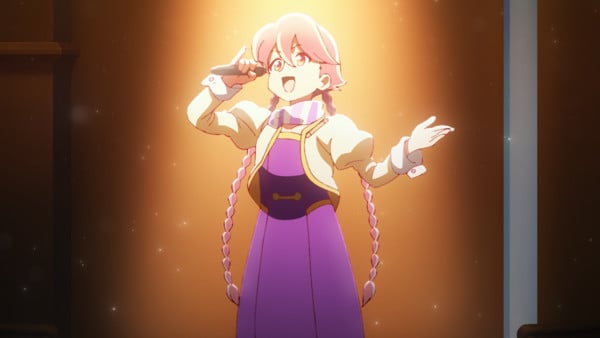
MURAKOSHI: I think changes from time to time, but as of the time of answering this question, I would say disposing of things. Even if you try to sort through things you don't use on a regular basis, you often find you can't throw them away. So, it might be a good idea to have them disposed of quietly without you noticing.
SHUNDO: I would like a robot that could work while I am sleeping so my work can continue 24 hours a day.
TAKENAKA: Expense calculations.
discuss this in the forum (1 post) |